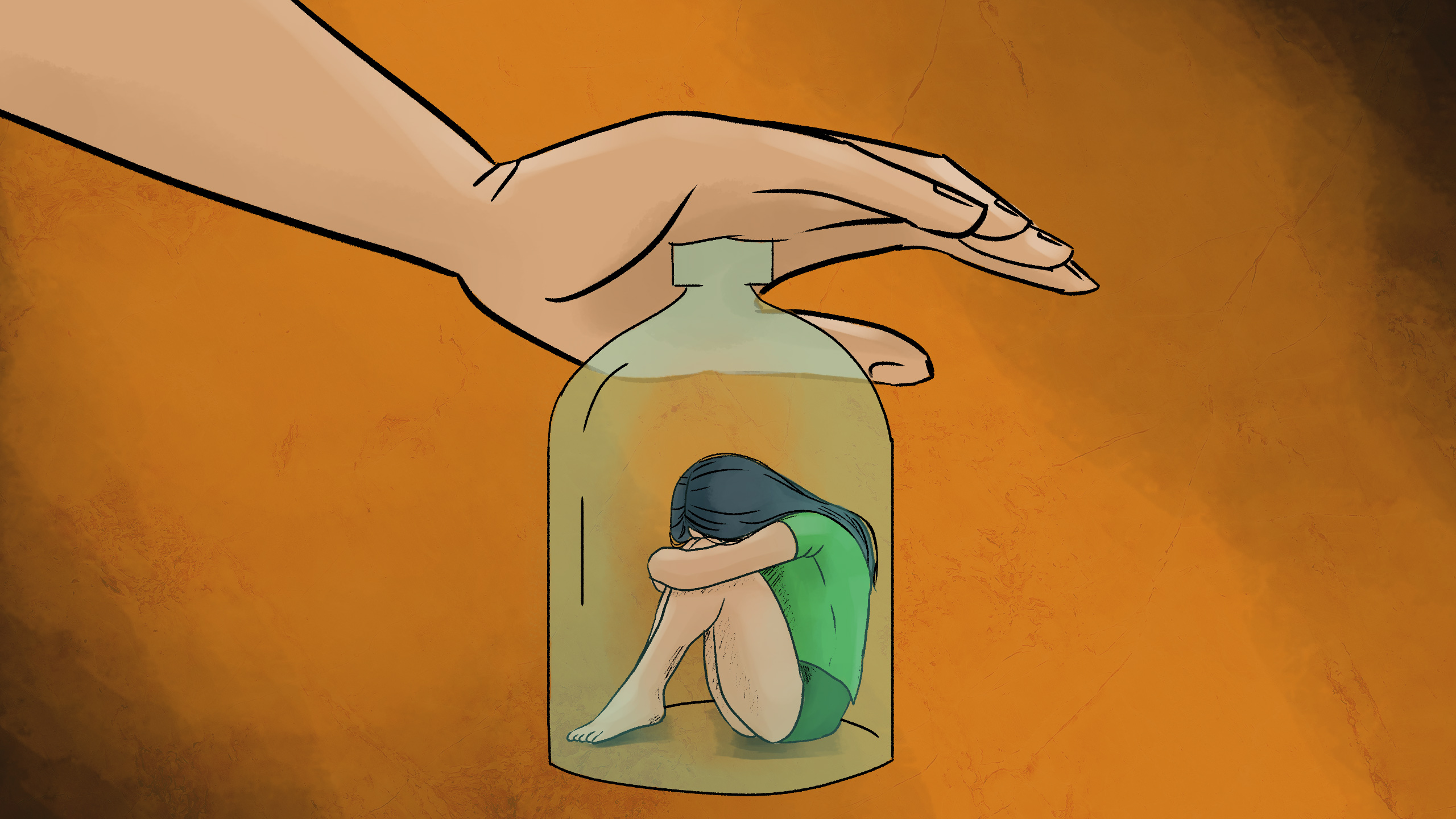
Take Your Power Back: 9 Subtle Signs Your Partner Is Gaslighting You
Does it seem like your partner turns the blame back on you no matter what you do?
It can be difficult enough to navigate the standard ups and downs of a relationship. Having an unsupportive or, worse yet, a combative partner can make you not only question why you’re in a relationship with them but also make you question yourself. You can struggle with your self-esteem at the best of times, but when your partner doesn’t support you or makes it seem like everything is your fault, you can suddenly find yourself feeling isolated and in a very dark place.
This type of relationship dynamic can be a strong indicator that your partner may be gaslighting you. Gaslighting is a toxic trait and a form of emotional abuse one partner inflicts on the other. It is also a subtle form of abuse that can be difficult to recognize, especially since it makes you question your thoughts and judgment.
If you are being subjected to gaslighting from your partner, you should seek help before you find yourself in an even worse situation. Counseling can help not just you but also potentially your partner. If the situation worsens, you should seek help immediately and get out of the relationship.
If you’re unsure that you are being gaslighted, we can help you recognize some of the subtle signs of it so that you can take back control and regain your power!
Join In 200 Million+ On The Journey to Greatness
What Is Gaslighting?
Gaslighting is a form of manipulation that is a sign of an abusive relationship. It is a very covert form of emotional abuse in which the abuser misleads the victim by creating a false narrative. This makes them question their judgment and alters their sense of reality. Ultimately, the victim of gaslighting starts to feel unsure about their perceptions of their environment and question their sanity.
Gaslighting happens over an extended time and causes the victim to question their recollection of events, leading to confusion, loss of confidence, and self-esteem. It can make the victim uncertain of their mental stability and creates a dependency on the person doing the gaslighting.
Gaslighting can be used to exert control in friendships or over family members, but it primarily occurs in romantic relationships. People who gaslight others could potentially have mental health disorders and use this type of emotional abuse to hold power over others to manipulate friends, family members, or even co-workers.
Subtle Signs of Gaslighting
Since gaslighting makes you question your memory of events and warps your sense of reality, it can be difficult to recognize warning signs of being gaslighted. When you’re reading about examples of how abusers go about gaslighting, the red flags can seem incredibly obvious, and you may wonder how anyone could ever fall prey to them. However, due to the subtle and long-term nature of this form of emotional abuse, the perpetrator essentially grooms the victim not to see what’s happening.
#1: They Tell You Lies of All Kinds
Trust is the foundation of any relationship, and lying typically breaks that trust quickly and leads one partner to exit the relationship as soon as possible. When one partner lies to the other, it’s typically to hide things like infidelity, financial irresponsibility, or similar things.
However, gaslighters are far less subtle in their lies. Most gaslighters tend to have narcissistic tendencies, which leads to them being chronic liars. Because of this, their lies can appear glaring to anyone observing from outside the relationship.
Even if you recognize that your partner is lying to you, the nature of gaslighting will still work against you. If your partner is a gaslighter, they will double down on the lie, insisting that they never said or did what you distinctly recall them having done. If you call them out on the lie, they will tell you that they never said or did such a thing and may even offer proof to back their claim, making you question if you’re mistaken.
#2: They Isolate You
One of the keys to gaslighting is to exert power over the victim. Making you feel isolated goes a long way toward building dependence on your abuser. To accomplish this, your gaslighting partner will take steps to warp your perception and turn those you’re closest to against you.
If you try to address an issue with your partner, they will often try to flip it around and convince you that you’re to blame for it. They will imply that you’re simply being too sensitive or emotional to lead you to believe that you may be overreacting, making you question your judgment.
A gaslighting partner will go so far as to use your friends and family in their ploys, too. They will accuse those closest to you of conspiring to interfere in your relationship to drive a wedge between you and them.
The gaslighter may even attempt to go to your friends and family under the guise of not wanting to confront you with issues. This manipulates them into addressing your mental state or what you’re doing wrong for your abuser.
#3: They Shut Down on You
In a healthy relationship, communication is one of the most important aspects. By candidly addressing issues, couples can work to compromise and overcome problems as they arise. Open and honest communication reduces the possibility of one partner growing to resent the other for what they do or don’t do.
When you’re in a relationship with a gaslighter, a lack of communication is a powerful weapon they can wield against you, though. Instead of talking out issues in a healthy way, gaslighters completely block you out after you attempt to address concerns with them. They may act like you’re not even there, refuse to talk to you, or ghost you and not respond to your attempts to text them.
This will cause you to worry about being in the wrong for bringing up the issue in the first place or regret how you brought it up. That’s precisely what the gaslighter wants — to distract you from what it is that you’re upset about and draw your focus on whether you mishandled the issue entirely.
They will even resort to repeating things under the pretense of communicating as a way to shut down conversations. Gaslighters will say things like, “Are we really talking about this again?” or, “I don’t have time for this,” as a way to minimize the importance of your feelings and cut you off. Over time, this behavior will make you feel like you have to walk on eggshells with your partner to avoid further conflict, giving them more of the power they seek.
#4: They Make You Say “I’m Sorry” Before They Ever Will
Gaslighters will lead you to believe that you’re the one at fault for anything and everything. If your partner is late for something you had planned, they might say it’s because you didn’t tell them when it was happening. Gaslighters need to be right about everything, and it’s going to be you who has to be wrong because their narcissism won’t allow them to accept any responsibility.
In the rare event that gaslighters do “apologize,” it’s almost never a genuine “I’m sorry.” They will twist an apology by saying, “I’m sorry that you got upset about this,” or, “I’m sorry that you had an issue with what I did.”
Phrasing “apologies” in this manner allows them to shift the blame from their mistakes onto your response; you’re the one who’s wrong. It subtly absolves them of responsibility and instead works to tear down your sense of resolve and self-confidence.
#5: They Work to Discredit You with Others
Gaslighters will spread rumors and gossip about you to others as a way to flex their manipulation powers. They will pretend to be worried about you while they’re telling others about how you seem emotionally unstable. This tactic can be highly effective and lead many people to side with the abuser because they don’t know the true story.
Someone who engages in gaslighting may even take it a step further and lie to you by telling you that other people also think this way about you. These people most likely have never said a bad thing about you, but the gaslighter will make every effort to convince you that they do.
Talking down about you to others is another way a gaslighting partner attempts to isolate you from the people who would otherwise be supportive of you. It becomes a double-edged sword of building perceived walls that you feel cut you off from those who love you while making them see you as withdrawn and reinforcing the lies they’re being told about you.
#6: They Answer Your Questions with Questions
When you ask a person who gaslights a question or call them out for something they did or said, they may attempt to change the subject by asking a question instead of answering what you asked. This distraction technique works because it not only throws off your train of thought, but it also causes you to question whether to press the issue when they act as if there’s no need to respond.
By answering questions with questions of their own, gaslighters avoid being cornered into definitive admissions of responsibility. Doing this helps them control the narrative and further asserts their power and influence over the situation and, as a result, their victim.
#7: They Will Attack You with Any Ammunition They Can
A partner who is gaslighting you will use the things or people you hold dear as ways to attack you in their efforts to tear you down. Because these are important to you, they carry extra weight and can be an effective way to break you down to give the gaslighter more power in your relationship.
That’s one of the key signs of gaslighting in close relationships. If you have children, they might tell you that it was a bad idea to have them or that your need to be a parent has had a negative impact on your relationship. They will spin the situation to make you feel like the kids get your focus at the expense of them getting what they need from you as a partner, causing you to feel guilty and neglectful.
If your job or hobbies are important, your gaslighting partner may attempt to use those as ways to chip away at your sense of self. Either of these will be cited as distractions that are harming the health of your relationship. They will tell you that they feel secondary and not as important to you as your professional or leisure pursuits as a way to build your dependence on them further and be your sole focus.
#8: They Drain You Both Physically and Emotionally
The most insidious thing about gaslighting is that it’s a gradual process that occurs over time. The occasional snide comment or lie seems almost innocuous at first, but that’s why it’s so effective.
As time goes on, even the most self-aware people can be sucked into the cycle and find themselves gradually worn down by the process. Like a trickle of water that erodes a mountain over the years, the subtle act of gaslighting chips away at the victim’s self-esteem.
Feeling exhausted by your interactions with your partner should be a red flag, signaling that you might be a victim of gaslighting. You’ll not only grow tired from the constant arguments but also from being on the defensive at all times and replaying discussions in your mind because you find yourself questioning your recollection of events.
#9: They Will Flatout Deny Gaslighting
Even when confronted with overwhelming evidence of their gaslighting behavior, your abusive partner will put on their best defense attorney act — Deny, deny, deny. This is due to the disconnect that narcissists have when it comes to accepting blame or fault and their penchant for lying easily.
You may very well be reading this article right now and be thinking: “Am I being gaslighted? I think I am!” and use it in confronting your partner. A true gaslighter would probably try and deflect your suspicions back on you, but they could potentially respond with a screaming red flag response if ever there was one:
“Gaslighting is not real.”
If faced with that scenario, please get yourself as far away from your partner as fast as you can.
How Do You Deal with Gaslighting?
If you’ve made it this far and recognized any of these signs of gaslighting that we’ve presented, the next step is figuring out how to fight against it. It’s hard enough just determining that you are a victim of this form of emotional abuse, but combating it is made all the more difficult because of the way gaslighting isolates you from your support structure and builds your sense of dependency on your abuser.
Gaining some distance from the situation can help you regain your bearings and begin taking steps to take your power back. This doesn’t just mean physical distance, as common relaxation techniques can help clear your mind and alleviate the intense emotions being gaslighted can trigger. Gaining clarity can help you better recognize the signs of your partner being a gaslighter.
Because gaslighting is intended to make you question yourself, keeping evidence of your experiences is a must. Keeping a journal to have a record in your own writing, screenshotting or otherwise saving text conversations, or saving emails to look back on later can be ways to remind yourself that you shouldn’t doubt your recollection.
Stand your ground, and set clear boundaries with your partner. Boundaries establish what you’re willing to accept in a relationship. Making it clear that you won’t allow your partner to trivialize or deny what you have to say can go a long way in protecting yourself from their gaslighting efforts.
Don’t let yourself get isolated from your closest friends and relatives in order to keep your support structure in place. While a gaslighting partner will seek to cut you off from those who care most about you, it’s often through lies and manipulation. Keeping in communication with those loved ones will enable you to get outside perspectives and help recognize signs of trouble. Being able to ask those who know you best if you seem like yourself or get their honest insights into how your relationship appears can help give you greater clarity.
Most of all, be willing to sever ties, walk away from a gaslighting partner, and end the relationship if needed. It can be painful and challenging to break up with someone you’ve committed to and thought of building a future with, but it’s not only okay to walk away from toxicity, it’s necessary!
Break Away from a Toxic Relationship
Gaslighting is just one way a relationship can become toxic. To learn more ways to recognize that you’re in a bad romance, head over to Greatness and check out our article, “Not Convinced? Here Are 7 Signs You’re in a Toxic Relationship.” Dr. Ramani Durvasula joined our podcast to discuss how to move on from a narcissistic relationship and find healing.
Don’t let someone else take your power away and tear you down. Recognize the signs of a toxic relationship and refuse to accept anything less than greatness!
Greatness Authors
Greatness Authors is a collection of writers, thinkers, curiosity experts, and students of the world who are committed to bringing you the most up-to-date, impactful, and inspiring information surrounding Greatness topics.

Redefining Poetry: How Instagram Sensation Rupi Kaur Showed That Poetry Is for Everyone

The 7 Best Vitamins to Naturally Promote Better, Uninterrupted Sleep According to Shawn Stevenson

The Science of Forming Healthy Habits & Letting Go of Bad Ones, According to Author James Clear

9 Signs You Have Imposter Syndrome at Work and How to Overcome Performance Insecurity

Olympian Yusra Mardini’s Incredible Story of Resilience, Rescue, and Refugee Rights










